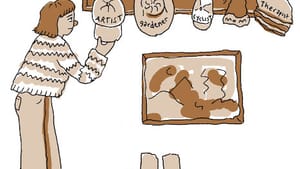Stay in the Loop
BSR publishes on a weekly schedule, with an email newsletter every Wednesday and Thursday morning. There’s no paywall, and subscribing is always free.
Donning — and doffing — the artist's hat
Be the "actor-and" you want to see in the world

It’s been three months since I put down all of my theater projects to focus on school, and now I find myself sitting face to face with an actor looking for direction. Well, a former actor. I’m a graduate student in psychology at Temple University — and I’m sitting with one of my very first clients.
Becca quit musical theater to work with kids in the juvenile justice system. She loves the work she does; she doesn’t miss acting, but she struggles with a private shame.
We learn in our classes that letting go of identities that no longer serve us can be liberating. But there is something very particular about setting aside the identity of "theater artist." To stop being an actor or a playwright is to tear yourself painfully from a promise that can save you and also destroy you.
Waking from the American dream
Working in theater promises that there is a place for you, you weirdo, you too-loud misfit, you queer and cast-out. That promise may have saved you when you were growing up in a place that had no place for you. However, in the voice of your “tell it like it is” acting teacher, theater also promises your work will be hard and painful, you will be poor and vulnerable, and you will have to endure.
The seductive promise of theater success is familiar because it’s also the promise of America. Expect suffering and expect reward. If you keep at it you’ll be a star, and if you quit, you’re just a supporting character in a story that was about the star all along.
Just as with the American dream, the major sin of the theater dream is to question or complicate it. It’s not the success that makes you worthy, it’s the buy-in.
And, also as with the American dream, the shadowy side of theatre’s promise is shame. If you don’t get to the dream, where does that leave you? It leaves you the one who didn’t love it hard enough, wasn’t willing to suffer enough, didn’t believe enough to deserve it.
Becca isn’t suffering because she abandoned her dream, she’s suffering because she abandoned the dream. She still loves to sing and dance. Yet she doesn’t want to sing and dance in community theater or in her kitchen on Sunday morning, because she still believes that using her gifts in service of anything but the promise would make her a loser.
Hold your "and" high
Just as in the American story, lots of people work hard in theater, and some work hard and are also lucky. Being a professional in theater is nice work if you can get it. It’s meaningful work, and beautiful.
For those lucky enough to have it, it might be wise to remember that perhaps you worked hard for it, but you also may have been in a position of privilege from the start. Let’s remember that there’s no shame in not being lucky. Those who don’t have the privilege of making their living as professional artists, I am beginning to realize, represent a massive silo of unused potential.
Becca, after all, can step into and inhabit another person’s world. Acting has made her compassionate and empathetic. She knows how to tell the same story in many different ways. She understands the power of subtext and tone. All of this is unspeakably valuable to the kids she works with in prison.
The limited promise of the dream is depriving us of the “artists-and” we really need. Artists-and-counselors, artists-and-leaders, artists-and-parents. Turn your talent toward a professional arts career if that’s what you really want. But there is no capitulation in wanting something “and.”
Becca’s not a quitter, and she’s not a loser. She’s an artist. And so are you, if you claim it.
Sign up for our newsletter
All of the week's new articles, all in one place. Sign up for the free weekly BSR newsletters, and don't miss a conversation.

 Cara Blouin
Cara Blouin
 Illustration by Hannah Kaplan
Illustration by Hannah Kaplan